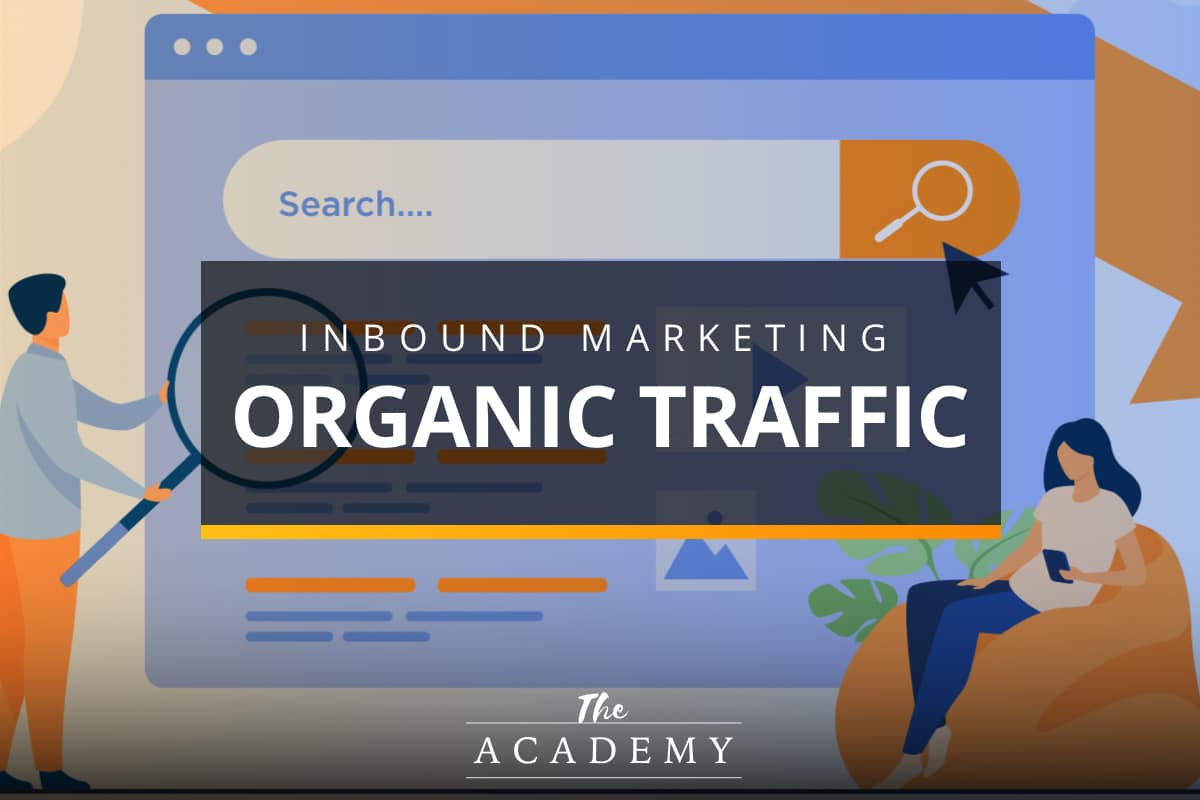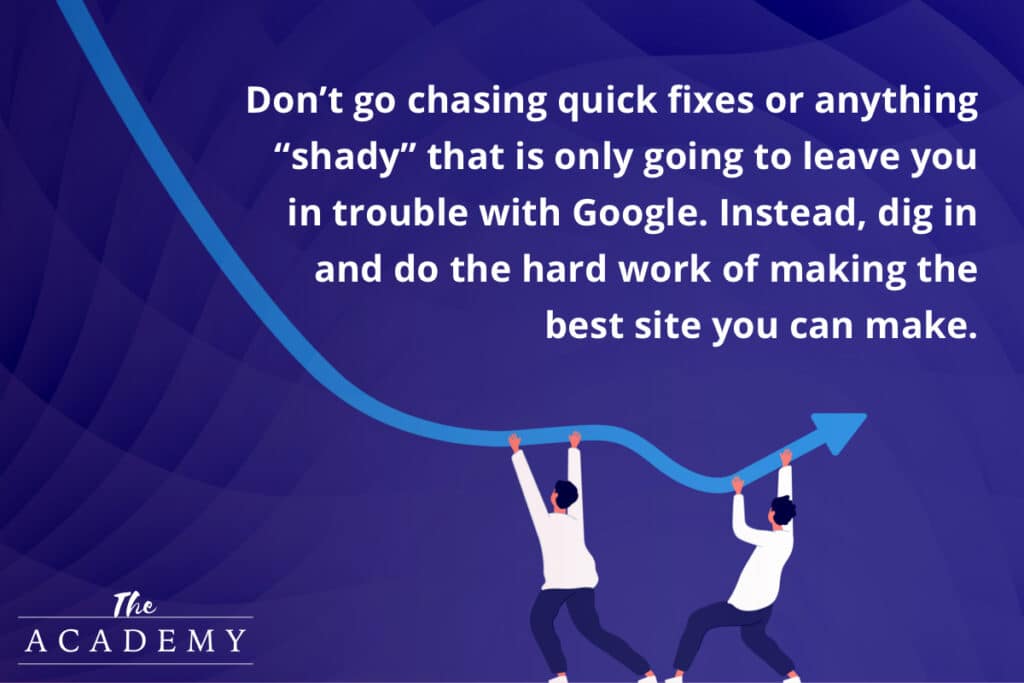
Building up a website to the point that it earns a significant flow of ongoing organic traffic is no easy task. You should feel quite proud if you get to that point, because there are countless sites on the web today and only a small fraction of those are able to attract a meaningful volume of organic visitors.
As exciting as it is to see your traffic graph trending up to the right, it’s just as disappointing when you see those numbers start to decline. You don’t feel like you are doing anything differently. You might even be working harder than ever, but the results are just not showing up. What do you do? That’s the question we’ll target in the article below. Let’s take a look at some strategies you may employ to hopefully turn around a negative traffic trend right away.
Start with the Big Picture
Before you start getting too far into making big changes, you’ll want to confirm that nothing has happened in the big picture that would cause your traffic to fall. A good place to start on this journey is to log into your Google Search Console account to see what the status of your site looks like from that perspective. Have there been any penalties applied to your site by Google? Are there any indexing problems that are causing some of your pages not to appear in search results? These aren’t the most likely cause of a traffic drop, but it’s best to eliminate these possibilities before going any further.
The nice thing about using the Google Search Console for insight is you will often have solutions provided for you if there are any problems on this side. Since it is Google that you are trying to impress to stay as close to the top of the rankings as possible, it’s wise to follow their suggestions to the best of your ability. Take care of any points that are highlighted in your Search Console account as soon as possible and you might find that your traffic starts to come back gradually in the weeks and months ahead.
The Dreaded Algorithm Update
We hate to even bring this one up, but it’s important to mention because this factor plays a big role in the world of search engine optimization and the quest for organic traffic. When a big Google search algorithm update hits, it tends to shake up the SEO world and move rankings for various sites up and down rather dramatically. If many of your rankings have dropped recently, and you aren’t sure why, an update may be to blame.
It’s easy to find out about these events by following one or two SEO blogs or social media channels. These are big news within the industry when they happen, so you won’t have to look far for updates and opinions. As a word of warning, don’t put too much stock in the opinions of one or two people regarding what they think Google was trying to do with the update. These kinds of things are quite secretive and even industry experts are just making educated guesses. Even if your site has fallen pretty dramatically, resist the temptation to react quickly. Instead, take your time, consider all factors, and gradually make changes that you might deem to be necessary in the aftermath.
Verify Data Accuracy
Another thing to keep in mind is that you’ll want to confirm that your traffic actually is dropping. Even if you have had Google Analytics installed and running on your site for years, it’s possible that something you changed on your site caused some pages not to record visits accurately, or at all. That would mean that the data you are viewing in Analytics are not correct, and you might not be facing the drop that you thought had occurred.
First, look at the code on your site and make sure it is correct and no problems have popped up. If you use a plugin to put the Google Analytics code in place, is that plugin still updating to work properly with current versions of WordPress? It shouldn’t take more than a few minutes to review things and make sure it’s all looking good. Those few minutes could save you months or years of frustration if you find that it was only a code error in the first place that created the illusion of a drop in traffic.
Get Back to Fundamentals
Okay. So far, we’ve talked about some things that could lead to your traffic numbers dropping. Maybe there was a Google algorithm update. Perhaps there are some structural problems with your site that are leading to indexing issues. Or, maybe, there isn’t even a drop in traffic at all, and you just need to fix a bit of tracking code.
But what if none of those things are to blame? What if your traffic is just dropping because you are being passed up in the rankings by competitors? That might be the most intimidating scenario of all, as it will mean that the strategies you had used earlier on to earn your traffic are not quite paying off like they used to.
In this case, our suggestion is to get back to the basics of search engine optimization and site building. Don’t go chasing quick fixes or anything “shady” that is only going to leave you in trouble with Google. Instead, dig in and do the hard work of making the best site you can make. If quality is what rises to the top and earns the most organic visits, you’ll need to simply focus on creating a better site.

What does that look like? The following points are a great place to start.
Focus on Content Quality
There is simply no substitute for delivering quality content to your audience. It’s hard to quantify how this impacts search rankings since those rankings are compiled by a computer rather than humans, but you can’t go wrong by spending time on creating the best possible pages for your visitors. Go back through your important pages, one by one, and look for opportunities to improve content quality by adding sections, making revisions, adding visuals, etc. Remember, good content is more likely to draw links, and links are always valuable when trying to maintain your ranking position.
When you update a page, be sure to update the publish date so it can easily be seen that this page has received recent attention and the information has not fallen behind the times. On the point of content quality, one other thing you can do is simply have each content page edited for grammar and spelling mistakes. Cleaning these things up will make your site look more professional and trustworthy.
Internal Linking
Internal links play an important role in search rankings and organic traffic, and should be part of a solid content strategy. It may be that the better your link structure is internally the easier it will be for the search bots to determine what your site is all about and what you have to offer visitors. Whatever the reasoning, it’s worth your time to review how your internal link setup looks and if there is anything you can do to improve it. Specifically, think about creating content “clusters” around certain topics that you cover on your pages.
For example, if you run a site that sells music equipment, and you have informational content pages you use to draw traffic, build sections for each different instrument. You might have content clusters for drums, guitars, trumpets, etc. Then, focus on strong internal linking within those clusters, to help build authority and highlight how much information you have to provide. Reviewing the layout of your internal links will take a while, and you might want to build a spreadsheet to track how you are linking to make sure you don’t leave any of your pages out in the cold without any connection to the others in its group.
Expand Your Content Scope
It might be that part of the cause of your drop in traffic is a simple saturation of the market you are serving. If you have already reached a large portion of the market, and they have viewed the content you offer on certain topics, they might not have much of a reason to come back. So, expanding out into new areas that are related could serve as an opportunity to bring some of that traffic back for future visits.
Taking this path would also serve to give you a bigger reach in your market as a whole, which could provide compounding benefits down the line from an SEO perspective. All other things being equal, a site with more content will have the potential to draw more traffic than a smaller site, so investing in added pages should prove to be something that pays off for years to come. Take some time to audit the content you currently have on your site and look for holes where you could write about topics that relate to your industry but won’t compete directly with pages that you’ve already created.
Optimize On-Page Factors
It tends to be the off-page stuff that draws most of the SEO attention, such as working to secure as many backlinks as possible. But there are plenty of on-page factors that you can dial in to make sure you aren’t harming your chances of ranking well by missing out on some of the basics. For instance, make sure you have optimized meta tags in place for each page, and consider rewriting some of those that aren’t performing well to see if you can achieve a boost in CTR. The nice thing about working on on-page SEO is that you don’t have to rely on anyone else to give you a link or approve a guest post. You just make the changes directly on your own site and wait to see what impact they have.
Unfortunately, there are no guaranteed techniques to get your organic traffic to quickly increase. That’s just not how things work on the web. But that doesn’t mean you should just throw up your hands and give up. With the ideas we’ve presented above, and plenty of hard work, you may be able to take your site to new heights in the months and years to come. Get started today!
Most Popular Articles

Seeing Favicons in Your Google Search Results? Here’s Why…
Have you noticed anything different in your Google Search results lately? Google added tiny favicon icons to its organic search results in January. It was…

Business Growth and Digital Marketing News & Tips 11-17-24
Are you encouraging and rewarding innovation? Lee Cockerell is the former Executive Vice President of Operations at Walt Disney World. A lover of traditional red…

Business Growth and Digital Marketing News & Tips 11-27-24
A culture of gratitude "Feeling gratitude and not expressing it is like wrapping a present and not giving it." – William Arthur Ward Beyond being…








